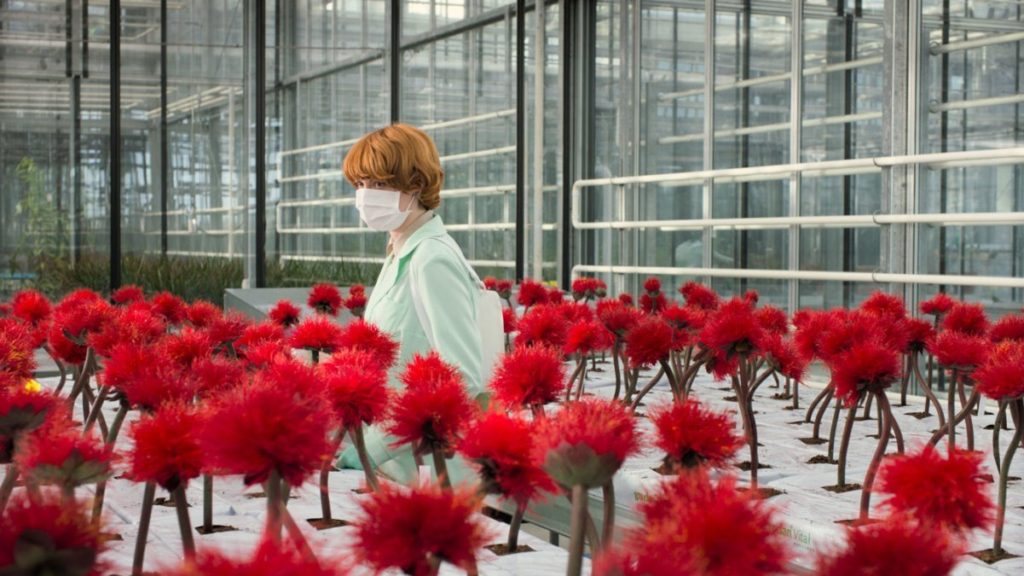This reviewer is a particular fan of Lourdes, possibly the Austrian filmmaker Jessica Hausner’s finest work in a steadily prospering career. Her English language debut has some components in common with the 2009 film. Perhaps more aptly that both share a placid, pensive female protagonist. Echoing a kind of science fiction fable of sorts, Little Joe does have a tad more social and even political splashes, akin to the TV phenomenon, Black Mirror.
Although there are whiffs of classic sci-fi notions engulfed by the likes of The Day of the Triffids or body-capture horrors in the vein of Invasion of the Body Snatchers, Little Joe might be far too subtle to be classified as homage. Hausner’s semi-dystopian vision here does provoke the mysterious strands of our senses, but the languid, strolling pace will not be for all.
Patience might well be a virtue with Little Joe. The narrative has a dry, deadpan progression, so slow in its forward movement that at times you simply have to settle for sideways or static. In some extraordinary way, though, this very monotonous and emotionless execution works effectively to build and sustain a mellow tension. Far quirkier, sharper dialogue ought to have put comparisons in the same sentence as Yorgos Lanthimos.
The restrained tale of the human condition and the alteration of the natural order is firmly filed under botany. The central character, Alice (Cannes Best Actress winner, Emily Beecham), is a senior worker at a plant breeding centre in London. A workaholic, Alice is on the brink of exposing a kind of genetic hybrid species of plant into the world, prior to some official testing.
Alice is also a single mother to Joe (Kit Connor), is sporadically wooed by her colleague, Chris (Ben Whishaw), and attends a session with a therapist (Lindsay Duncan). There’s little outward enthusiasm in Alice, but she is clearly a determined, fearless woman. By her own admittance, her only worry is that something would happen to her son – ironically when events do take a turn involving Joe she appears to be the last to realise. The mother-son relationship has little sparks, but remains comfortably authentic.
The title refers to the vivid red plants that Alice has been breeding. One of which, in a moment of pride-over-professionalism, Alice takes home as a gift to her son – thus Little Joe. Back at work, Alice has to contend with the mental mishaps of Bella (Kerry Fox) and her dog, as well as some friction from other workers, Karl (David Wilmot) and Ric (Phénix Brossard).
The flickering, scarlet plants literally soak up the atmosphere, steaming up the windows of the lab as well as shriveling up the other floral specimens in the room. More alarmingly, the plats give off a misty pollen, which when inhaled has significant behavioral repercussions. Firstly, Bella’s dog, having been locked in the lab, now barks and snarls at her owner.
The strange goings-on seem to be complacently handled by Hausner, in an environment that was already somewhat hostile and downbeat. And that certainly suits the clinical tones of the film’s development and style. Though this also means that little change in the air leaves little room for expanding any kind of strong or sinister elements of sci-fi or horror. The side-effects are an engaging sense of paranoia and the cautiously disturbing, rather than flailing into gore and the gruesome. Not necessarily a bad thing.
Jessica Hausner co-wrote the intriguing screenplay with Geraldine Bajard. And their partially vapid world touches on the satirical and the observational, without really ever packing a heavy enough punch to have your spine tingling. Little Joe might be slow out of the tracks, but is constantly hypnotic nonetheless.
Thanks in large part to Emily Beecham. The actress hardly moves a muscle, but we constantly experience her ponderous glares and brooding body language. Beecham’s consummate, toned down performance is perfectly to scale. As the tables turning on the dynamics of these characters, Beacham allows the incredulous Alice to become the odd one out in way. As those around her succumb to their own chemical imbalance.
Clearly, Little Joe is figurative for strong social issues that are encountered universally, like the journey of adolescence and the need for anti-depressants. That constant buzz whenever we’re in the lab, as well as that uniquely unnerving score, fill us with unease throughout. But it is not a hard watch, far from it.
So immaculately eye-catching is the production design, being invited and immersed in these surroundings is hard to resist. Such standard, minimalist work arenas and greenhouses have hardly looked so lavish and enticing. Even the camera, beautifully drifting side to side, or zooming slowly into empty parts of the frame, captures a sparse and sterile landscape. And so, the London neighbourhoods seem all the more sequential and symmetrical on the rare occasion we get to venture outside.
Little Joe is extremely accomplished in its premise and set-up, but all good plants need constant water and sunlight to blossom. The repetition of the film’s key flares tend to dry out our expectation after a while. The film certainly does not wilt altogether, but the cautionary proceedings often halt the narrative’s growth. Little Joe in the end is only moderately unsettling, when it could have been as magnetic and remarkable as it once promised.

